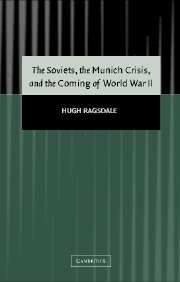Book contents
- Frontmatter
- Contents
- List of Maps
- Acknowledgments
- List of Abbreviations
- Foreword
- Preface: A Test Case of Collective Security
- Introduction: The Nature of the Problem
- Part One Background of the Munich Crisis
- Part Two Foreground: Climax of the Crisis
- Part Three Conclusion
- 7 What the Red Army Actually Did
- 8 What the Red Army Might Feasibly Have Done
- 9 Epilogue
- 10 Assessment of Soviet Intentions
- Appendices
- Index
9 - Epilogue
from Part Three - Conclusion
Published online by Cambridge University Press: 07 September 2010
- Frontmatter
- Contents
- List of Maps
- Acknowledgments
- List of Abbreviations
- Foreword
- Preface: A Test Case of Collective Security
- Introduction: The Nature of the Problem
- Part One Background of the Munich Crisis
- Part Two Foreground: Climax of the Crisis
- Part Three Conclusion
- 7 What the Red Army Actually Did
- 8 What the Red Army Might Feasibly Have Done
- 9 Epilogue
- 10 Assessment of Soviet Intentions
- Appendices
- Index
Summary
There were other consequences of the decisions taken at Munich, multiple consequences for the whole of Europe. Having been rendered defenseless by the surrender of border fortifications, Czechoslovakia was unable to offer any resistance when the German army moved beyond the demarcation line of Munich and into the purely Czech territory of Bohemia and Moravia in March 1939. At the same time, Hitler sponsored the independence of Slovakia before turning it into a satellite regime. Meanwhile, Poland, having blindly assisted in the mutilation of Czechoslovakia, thus destroyed a potential ally against the aggressor and became thereby the next virtually defenseless victim. When Poland fell, the French were left without any continental ally to divert a part of the strength of the German army from their own frontier. To make matters worse, the Wehrmacht capitalized on the excellent military hardware of the former Czechoslovak army to train and equip ten new divisions at once. Half of the tanks deployed by General Erwin Rommel's Panzer division in France in 1940 – the most rapidly advancing German division in the campaign – were of Czechoslovak manufacture. The French, like the Poles, had contributed in the sacrifice of Czechoslovakia to their own undoing.
Just as Foreign Minister Nicolae Petrescu-Comnen had foreseen, the Munich tragedy engulfed his own Romania as well. Its Little Entente security pact disappeared along with Czechoslovakia, and the new Soviet–German comity following the Nazi–Soviet Pact of August 1939 portended no good for Romania. In June 1940, the Soviet Union annexed Bessarabia.
- Type
- Chapter
- Information
- The Soviets, the Munich Crisis, and the Coming of World War II , pp. 168 - 181Publisher: Cambridge University PressPrint publication year: 2004



